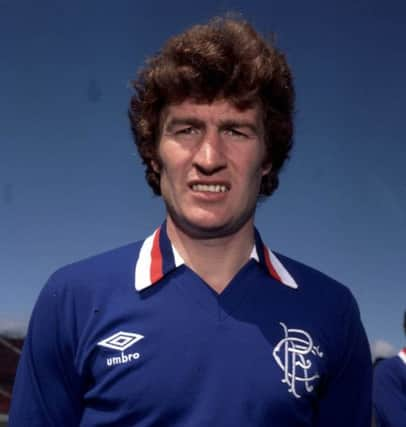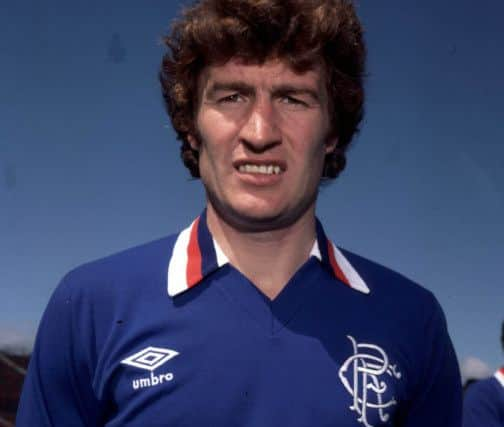Obituary: Sandy Jardine, footballer


The death from cancer of Sandy Jardine has occasioned heartfelt tributes from every corner of Scottish football and beyond, all mourning the loss of someone revered for his qualities both as a player and as an indomitable man.
Jardine truly was a figure who transcended such divides as those between Rangers and Celtic, and Glasgow and Edinburgh, for his classiness on the pitch as a player for Rangers, Hearts and Scotland was matched by his graciousness and nobility off it.
Advertisement
Hide AdAdvertisement
Hide AdThose qualities and his sheer courage were to the fore as he fought in recent times for the future of the Ibrox club while already suffering from the disease that so cruelly ended his life.


Born on Hogmanay, 1948, the son of James, an Edinburgh bus driver, Jardine’s first footballing love was his local side Hearts. He attended Balgreen Primary School where his all-round footballing talent was soon noticed.
At Tynecastle Secondary he won national schoolboy honours, and also played for North Merchiston Boys Club, Edinburgh Athletic and United Crossroads Boys Club.
Nicknamed Sandy because of his hair colour, Jardine was destined for the professional game from an early age, and on leaving school at 15 he joined the groundstaff of Rangers as an apprentice. He turned fully professional at 17, and made his debut for the Ibrox club in the wake of their momentous defeat in the Scottish Cup by Berwick Rangers.
The 18-year-old Jardine came into the side which manager Scot Symon was in the course of reshuffling. His debut, ironically, was against Hearts, playing at right-half, and on the rebound from their worst ever result, Rangers thrashed the Edinburgh side 5-1, Alex Willoughby scoring a hat-trick.
It was to be the first of more than 1,000 matches, both competitive and friendlies, played by Jardine – he remains the only Scot to have played 1,000 games in first class professional football.
Symon and his successor Dave White played Jardine in different positions, including centre forward on 12 occasions during which he scored 11 goals, but when Willie Waddell arrived to manage Rangers in 1969, he soon decided that right-back was Jardine’s position and he wore the No. 2 jersey from then on.
The team was led by captain John Greig, also Edinburgh-born, who was the only man to surpass Jardine’s record of 674 competitive appearances for the club.
Advertisement
Hide AdAdvertisement
Hide AdThis was the era of Celtic’s nine-in-a-row dominance of the Scottish League, but in season 1970-71, Jardine earned his first medal when Rangers won the Scottish League Cup, beating Celtic 1-0 in the final.
That season also saw Jardine make his first appearance for Scotland, coming on as a substitute in a friendly against Denmark at Hampden on 11 November, 1970, the Scots winning 1-0.
It was not until 1973 and the 1-0 defeat by England at Wembley that Jardine formed his famous full-back partnership with Celtic’s Danny McGrain. They would play 19 times together for Scotland in all, including all three matches in the 1974 World Cup finals in which Scotland were undefeated but exited after the group stage on goal difference.
Jardine also played for the national side in the 1978 World Cup Finals in Argentina, and made his 38th and final appearance for Scotland in the loss against Belgium in December 1979. In all, he captained Scotland nine times.
For Scotland under Tommy Docherty, Willie Ormond, Ally McLeod and Jock Stein, and for Rangers under Waddell and his successors Jock Wallace and Greig, Jardine was encouraged to display his qualities both in defence and attack, becoming one of the original modern attacking full-backs.
His superb fitness saw him rack up season after season in the first XI at Ibrox, several times being an “ever present” in league campaigns, and he gained four more League Cup winners’ medals, three Scottish League Championship medals, and five Scottish Cup winners’ medals. He also scored 77 goals in his 16 seasons at Rangers, and in 1975 he was voted Player of the Year by the Scottish Football Writers Association.
One of his finest games was the European Cup-Winners Cup Final in Barcelona in 1972, in which Rangers beat Moscow Dynamo 3-2. Jardine was again an “ever present” in that campaign, and scored the early opening goal against Bayern Munich in the semi-final which put Rangers on the road to Spain and glory.
In 1982, after a testimonial match against Southampton, Jardine told his friend and manager Greig that he wanted to leave to become assistant manager at Hearts, his boyhood heroes. Greig was reluctant to let Jardine go, even though he was already 33, surmising correctly that Jardine had several years left to play.
Advertisement
Hide AdAdvertisement
Hide AdThose years were spent at Tynecastle where Jardine joined his friend and former Rangers’ colleague Alex MacDonald who had taken over as manager of a club then in the second tier of Scottish football.
They took Hearts into the Premier League the very next season and came within minutes of winning the championship in 1985-86, the season in which Hearts also reached the Scottish Cup Final.
His importance to the side that season was recognised with his second Player of the Year award at the age of 37, emulating Greig as the second man to win the award twice.
Jardine also played for Hearts in the Uefa Cup, becoming one of a select band of Scots to play in all three European competitions.
In all, Jardine made 277 appearances for Hearts, for whom he was appointed joint manager by chairman Wallace Mercer in 1986 after a report that Aberdeen were keen to have Jardine as Alex Ferguson’s replacement.
Mercer subsequently dispensed with Jardine’s services in November 1988, a move which was opposed by many Hearts fans and which amazed many in Scottish football at the time.
Jardine then worked for Scottish Brewers before returning to Ibrox in various public relations, sales and marketing capacities. He was inducted into the Scotland and Rangers Halls of Fame, and indeed he was in charge of the latter.
It pained him greatly that the two clubs he served both fell into administration, but it was at Rangers during the administration and liquidation process that Jardine’s battling qualities came most to the fore.
Advertisement
Hide AdAdvertisement
Hide AdHe and manager Ally McCoist took much of the burden of keeping Rangers going on a day-to-day basis on their own shoulders, and Jardine famously led a march of up to 10,000 fans to Hampden Park in April 2012 to protest against SFA sanctions on the Ibrox club.
Behind the scenes his influence was even greater, and his bond with the fans made him a crucial figure in the club’s survival.
The shocking news in November 2012, that he had developed cancer of the throat and liver was a hammer blow to all at Rangers. Jardine battled against the disease with his customary dignity until he finally succumbed, surrounded by his family, on Thursday.
Rangers have announced a minute’s silence before today’s match against Stranraer, but when the clock shows two minutes, the fans are planning to stand and applaud the man who wore the No. 2 short with such distinction. It will be a poignant but utterly deserved tribute to a legendary footballer and fine man.
Sandy Jardine is survived by his wife Shona, their children Steven and Nicola, and his grandchildren.